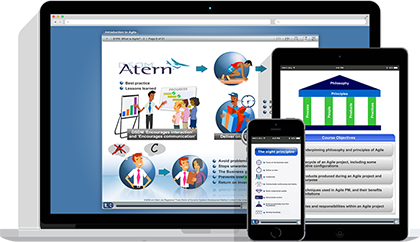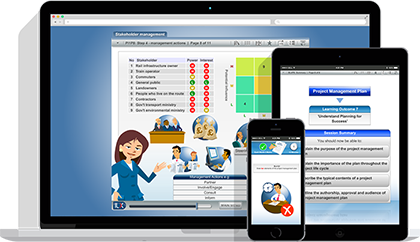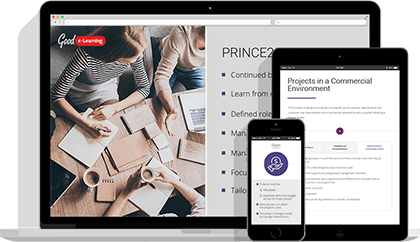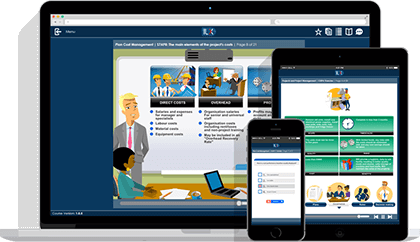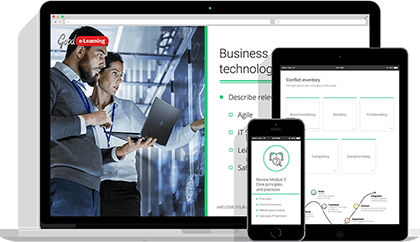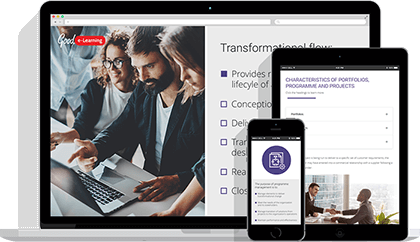
€479.00Add to cart
€479.00Add to cart
Project Management:
Managing Successful Programmes (MSP)® Foundation
6 months e-learning + exam voucher
€479 + VAT
“Project Manager
is a person who believes
nine women can deliver a baby
in one month.”
Project Management:
Managing Successful Programmes (MSP) 5th Edition Foundation
E-learning + Web-based examination
€479.00Add to cart
Key information about this course:
Price: 479 € + VAT ( 6 month E-learning + Exam Voucher)
- 12+ hours of course material included
- Fully accredited training course
- Expert tutor support
- Fully mobile compatible
- 6 months access – start today!
- FREE Exam voucher

This MSP Foundation course offers an excellent introduction to MSP project management. Students will become familiar with the processes, principles and governance themes that make up MSP, along with the six MSP Transformational Flow Processes. This will allow them to make valuable contributions to programme management teams in an MSP environment.
By the end of the course, students will be fully prepared to sit and pass the MSP Foundation examination. Students will also receive a FREE exam voucher for the official exam. Earning the MSP Foundation certification is a prerequisite for taking the MSP Practitioner examination.
MSP® Foundation training is provided by Good e-learning, accredited by PeopleCert.
Managing Successful Programmes (MSP) offers a proven set of practices and principles for successful programme management. It helps users to break complex programmes down into straightforward projects which, once completed, are worth more than the sum of their parts. This approach enables organizations to achieve high-priority business goals on time, within budget and with a higher level of quality.
MSP project management goes beyond standard assembly-line thinking. It offers guidance on a number of crucial points, such as clarifying lines of communication and responsibilities, planning results-oriented tasks, risk and change management, and more.
This course is designed to fully prepare you to sit and pass the MSP Foundation examination and equips students with a clear overview of MSP processes, as well as how to apply and adapt them for individual programmes. On passing the MSP Foundation examination, students will be ready to make valuable contributions to programme management teams within their own organizations.
One of the biggest benefits of MSP is its flexibility. It can be applied to any programme, regardless of size, sector, industry or location. At the same time, MSP also encourages users to learn from their mistakes, allowing them to continuously improve and adapt their plans as they go along.
- The concepts, responsibilities and key facts of the principles and governance themes of MSP
- The six MSP Transformational Flow Processes
- How to create and tailor MSP frameworks for real-world organizations
- Everything needed to pass the official MSP Foundation exam
Course Syllabus
This module provides an introduction to this Managing Successful Programmes (MSP) Foundation course, as well as MSP itself. What is it? What is it used for? What makes MSP so unique?
The module will also outline the learning aims and objectives for the rest of the course.
This module introduces students to what constitutes a ‘programme’ in an MSP environment. This includes:
- Characteristics of MSP programmes and programme management
- How different elements in programme management environments relate to each other
- The triggers for vision-led, emergent and compliance programmes
Students will learn the three core concepts which make up MSP: ‘Principles’, ‘Governance Themes’ and ‘Transformational Flows’. This module will give particular focus to the Principles, which improve the probability of a programme successfully achieving its objectives. They include:
- Remaining aligned with corporate strategy
- Learning from experience
- Designing and delivering a coherent capability
- Adding value
- Focusing on benefits and threats to them
- Envisioning and communicating a better future
- Leading change
This module goes into more detail about the nine Governance Themes of MSP:
- Organisation
- Vision
- Leadership and Stakeholder Engagement
- Benefits Realisation Management
- Blueprint Design and Delivery
- Planning and Control
- The Business Case
- Risk Management and Issue Resolution
- Quality Management
Students will learn to identify the most important roles in MSP governance: the Senior Responsible Owner (SRO), Programme Manager, Business Change Manager (BCM) and the Programme Office. They will also study the characteristics of MSP strategies and plans.
This module will go into more detail about the roles defined in MSP: the Sponsoring Group, SRO, Programme Board, Programme Manager, BCM(s), Business Change Team and the Programme Office. This will include the typical membership found in the Sponsoring Group and Programme Board, the core functions and two distinct roles of the Programme Office, and the three features of an effectively organised MSP programme.
By the end of the module, students will be able to identify the purpose and responsibilities of the Sponsoring Group, Programme Board, SRO(s), Programme Manager, BCM(s), Business Change Team and Programme Office. They will also be able to recite the purpose of the MSP organisation structure.
This module will cover the purpose and content of an MSP ‘Vision Statement’. Students will learn to identify the characteristics of a well-made vision statement and the types of content that they contain.
The module will also cover the main areas of focus for the ‘Vision’ Governance Theme in relation to the SRO(s), Programme Manager and BCM(s).
This module will cover the topic of stakeholders, the role they play in MSP programmes and how programme managers must interact with them.
As well as the definition of ‘stakeholder’ in the context of MSP, students will learn to identify the purpose of:
- The influence/interest matrix
- The programme communications plan
- The stakeholder map
- The stakeholder engagement strategy
- Stakeholder profiles
- Visioning workshops
- The ‘do-nothing vision’
Students will come to understand the importance of stakeholders to a programme and the impact it can have on them, depending on the level and type of stakeholder. The module will also cover the communication process, with students learning the four core elements of successful communication, how to make messages more effective and how to ensure stakeholder participation even with non-participative media.
The module will focus on the Governance Theme of ‘Leadership and Stakeholder Engagement’, as well as how it relates to the roles of SRO(s), Programme Managers, BCM(s) and Programme Offices.
This module covers the Benefits Management practices of MSP. Students will learn to identify the four critical validation tests of a ‘benefit’ (DOAM), as well as how benefits are best described using change terms.
Students will also come to understand how to identify the outputs, capabilities, outcomes, benefits and disbenefits in given programmes. They will also learn the purpose and activities of each step of the generic four-step cycle for managing benefits on any programme.
The module will then move on to the purpose of the benefits map and benefits profiles, and the content typically found within them.
By the end of the module, students will be familiar with the main areas of focus for the Governance Theme of ‘Benefits Realisation Management’ in relation to SRO(s), Programme Managers, BCM(s) and Programme Offices. They will also understand the reasons why benefits management can continue beyond the conclusion of a programme.
This module covers the design and delivery of blueprints, with particular focus on ‘POTI’ models (Processes, Organisation, Technology and Information).
Students will learn the definition of each element of POTI models, as well as the purpose and types of content typically found in MSP blueprints. They will also learn the specific purposes of tranches and work streams.
The module will also focus on the Governance Theme of ‘Blueprint Design and Delivery’, and how it relates to SRO(s), BCM(s), Programme Managers and Programme Offices.
This module covers the importance of programme planning and programme control. Students will look at the definition of ‘resources’ in MSP and how they relate to the Governance Theme of ‘Planning and Control’. The module will also cover the roles of SRO(s), Programme Managers, BCM(s) and Programme Offices in relation to Planning and Control.
Students will learn the purpose of monitoring and controlling strategy, programme plans, projects dossiers, resource management plans and resource management strategies, as well as the content that is typically found in project dossiers. They will come to understand the ways in which live projects are monitored, and the three types of dependencies that must be managed during a programme.
This module focuses on the ‘Business Case’ Governance Theme. Students will learn to identify the purpose and types of content found in a typical business case, as well as the questions which it must be able to answer during the life cycle of a programme. The different types of programme costs will also be identified and explained.
Students will also focus on the roles played by SRO(s), Programme Managers, BCM(s) and Programme Offices in relation to the Business Case Governance Theme.
This module covers the Governance Theme of ‘Risk Management and Issue Resolution’. Students will learn to define ‘risk’, ‘issue’ and ‘configuration item’, while also learning the defined risk responses of MSP. They will also become familiar with the three perspectives associated with managing programme issues and risks.
By the end of the module, students will be able to identify descriptions of:
- Impact
- Probability
- Proximity
- Risks (including causes, events and effects of threats and opportunities)
- Defined risk responses
- Typical sources of risks and issues
Students will also be able to identify the purpose of:
- Programme and issue management
- Issue registers
- Issue management strategies
- Probability impact grids
- Summary risk profiles
- Progress reporting
- Risk management strategies
- Risk registers
- Risk owners
- Risk actionees
The roles of SRO(s), Programme Managers, BCM(s) and Programme Offices in relation to Risk Management and Issue Resolution will also be covered.
This module looks at how MSP practitioners can ensure that programmes are delivered with optimum quality. This will include a look at auditing, as well as the effectiveness of measurements, assurance reviews, P3M3 maturity assessments and gated reviews.
By the end of the module, students should be able to identify the purpose and scope of:
- Programme quality and assurance
- Information management plans
- Information management strategies
- Quality and assurance plans
- Quality and assurance strategies
- Asset management
- Configuration management
- Programme quality management
- Project quality management
Students will also cover the roles of SRO(s), Programme Managers, BCM(s) and Programme Offices in relation to the MSP Governance Theme of Quality Management.
This module focuses on the six MSP Transformational Flow Processes. Students will learn the name and sequencing of each process, as well as the three distinct sets of activities undertaken during the ‘Realising the Benefits’ Transformational Flow Process:
- Manage pre-transition
- Manage transition
- Manage post-transition
The module will highlight the reasons for:
- Identifying and defining a programme
- Managing the tranches
- Delivering the capability
- Realising the benefits
By the end of the module, students will know the purpose and types of content found in the programme mandate, programme brief and the programme definition document. They will also learn the purpose of the programme preparation plan and project brief. Finally, students will know the tests for programme closure and the reasoning behind the Transformational Flow Process of ‘Closing a Programme’.
Here, we offer students the chance to put into practice what they have learned so far. These exams are designed to simulate the official MSP Foundation examination and offer students the questions with rationale to review the key points covered.
When you feel you are ready to sit the exam, simply contact Good e-Learning to request your FREE exam voucher.
Exams / Assessments
In order to achieve your MSP Foundation certification, you will need to pass the MSP Foundation examination. Earning an MSP Foundation certification is also a prerequisite for sitting the MSP Practitioner examination.
You can take the exam online (virtually) using a service provided by PeopleCert.
To support you with your preparations, this course contains practice exams to simulate the conditions of the real thing. If there are any points in the course which you are struggling with, you may also contact a member of the support team for assistance.
Before booking your exam, it will be a good idea to make sure that your device meets the technical requirements. You can do so via this online test. This test will examine the suitability of your webcam, microphone and internet connection. Please visit the PeopleCert website for more information and guidance.
- This is a multiple choice exam consisting of 75 questions
- There is a time limit of 60 minutes to complete the exam
- The exam is closed book, with only the provided materials being permitted for use
- The pass mark for the exam is 50%: you must get 35 out of 70 questions correct
- In countries where English is a second language, the time allocated for the exam is extended to 75 minutes
Accredited Managing Successful Programmes (MSP)® Foundation training is provided by Good e-learning, accredited by PeopleCert.

